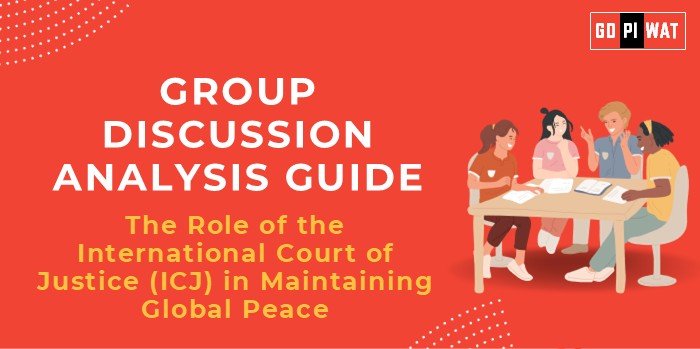📋 Group Discussion Analysis Guide: The Role of the International Court of Justice (ICJ) in Maintaining Global Peace
🌐 Introduction to the Topic
📖 Opening Context
The International Court of Justice (ICJ), as the principal judicial organ of the United Nations, plays a pivotal role in resolving disputes between nations and fostering peace. At a time of rising geopolitical tensions, understanding its impact is essential for aspiring global leaders in B-schools.
📜 Topic Background
Established in 1945, the ICJ was formed to adjudicate disputes submitted by states and provide advisory opinions on legal matters. It underscores international law as a framework for peaceful coexistence. The Court has recently been active in cases involving territorial disputes, environmental protection, and human rights violations.
📊 Quick Facts and Key Statistics
- 📍 Established: 1945, under the UN Charter, Hague, Netherlands.
- 👩⚖️ Judges: 15, elected for nine-year terms by the UN General Assembly and Security Council.
- ⚖️ Cases Handled: Over 180 since its inception, including disputes between states and advisory opinions.
- 💰 Budget: ~$47 million annually, indicative of its global operational scale.
- 🌍 Impact Metric: Resolved boundary disputes, e.g., Nicaragua vs. Colombia (2012), preventing armed conflict.
🤝 Stakeholders and Their Roles
- 🏛️ Member States: Submit disputes or abide by rulings to ensure compliance with international law.
- 🌐 United Nations: Supports and legitimizes the ICJ’s role within its peacekeeping framework.
- 📚 International Organizations: Seek advisory opinions on legal questions (e.g., WHO, UNESCO).
- 👥 Civil Societies and Academics: Advocate for broader awareness and compliance with ICJ decisions.
🏆 Achievements and Challenges
✨ Achievements
- 🤝 Peaceful Resolutions: Resolved disputes like the Bakassi Peninsula conflict (Nigeria-Cameroon, 2002).
- 📜 Advisory Opinions: Influenced policies, e.g., legal opinions on Kosovo’s independence.
- 🌱 Environmental Justice: Landmark rulings like the Uruguay-Argentina pulp mill dispute (2010).
⚠️ Challenges
- 📉 Non-Compliance by States: Powerful nations often ignore rulings.
- 🔍 Limited Jurisdiction: Only sovereign states can bring cases, excluding individuals or entities.
- 🌍 Global Comparisons: Courts like the European Court of Justice handle broader issues, offering a contrast to ICJ’s limited scope.
📖 Case Study:
Nicaragua vs. USA (1986): The USA refused to accept the Court’s ruling, highlighting enforcement challenges.
💡 Structured Arguments for Discussion
- 🛠️ Supporting Stance: “The ICJ’s peaceful resolution of boundary conflicts has prevented wars, making it a cornerstone of global peacekeeping.”
- 🛡️ Opposing Stance: “The ICJ lacks enforcement mechanisms, reducing its effectiveness in maintaining peace in cases of non-compliance.”
- ⚖️ Balanced Perspective: “While the ICJ provides a legal framework for peace, its success depends on state cooperation and broader UN support.”
🎯 Effective Discussion Approaches
🔑 Opening Approaches
- 📊 Quote relevant ICJ case data to establish its effectiveness.
- 📖 Highlight challenges in non-compliance with real-world examples.
⚙️ Counter-Argument Handling
- ✅ Reference examples like the Nicaragua case to show where enforcement fell short.
- 💡 Propose strengthening enforcement mechanisms through UN reforms.
🧠 Strategic Analysis of Strengths and Weaknesses
SWOT Analysis:
- 💪 Strengths: Promotes peaceful resolutions; upholds international law.
- 🛠️ Weaknesses: Enforcement issues; limited jurisdiction.
- 🌟 Opportunities: Expanding its scope to include non-state actors.
- ⚠️ Threats: Geopolitical power imbalances.
🏫 Connecting with B-School Applications
📚 Real-World Applications
- 🌍 Projects on international law, peace negotiations, or UN reforms.
🎓 Sample Interview Questions
- ❓ “How can the ICJ address compliance issues effectively?”
- ❓ “What role does international law play in global business operations?”
💡 Insights for Students
- 📈 Explore ICJ’s role in economic disputes.
- 💼 Assess its influence on global corporate social responsibility (CSR).


